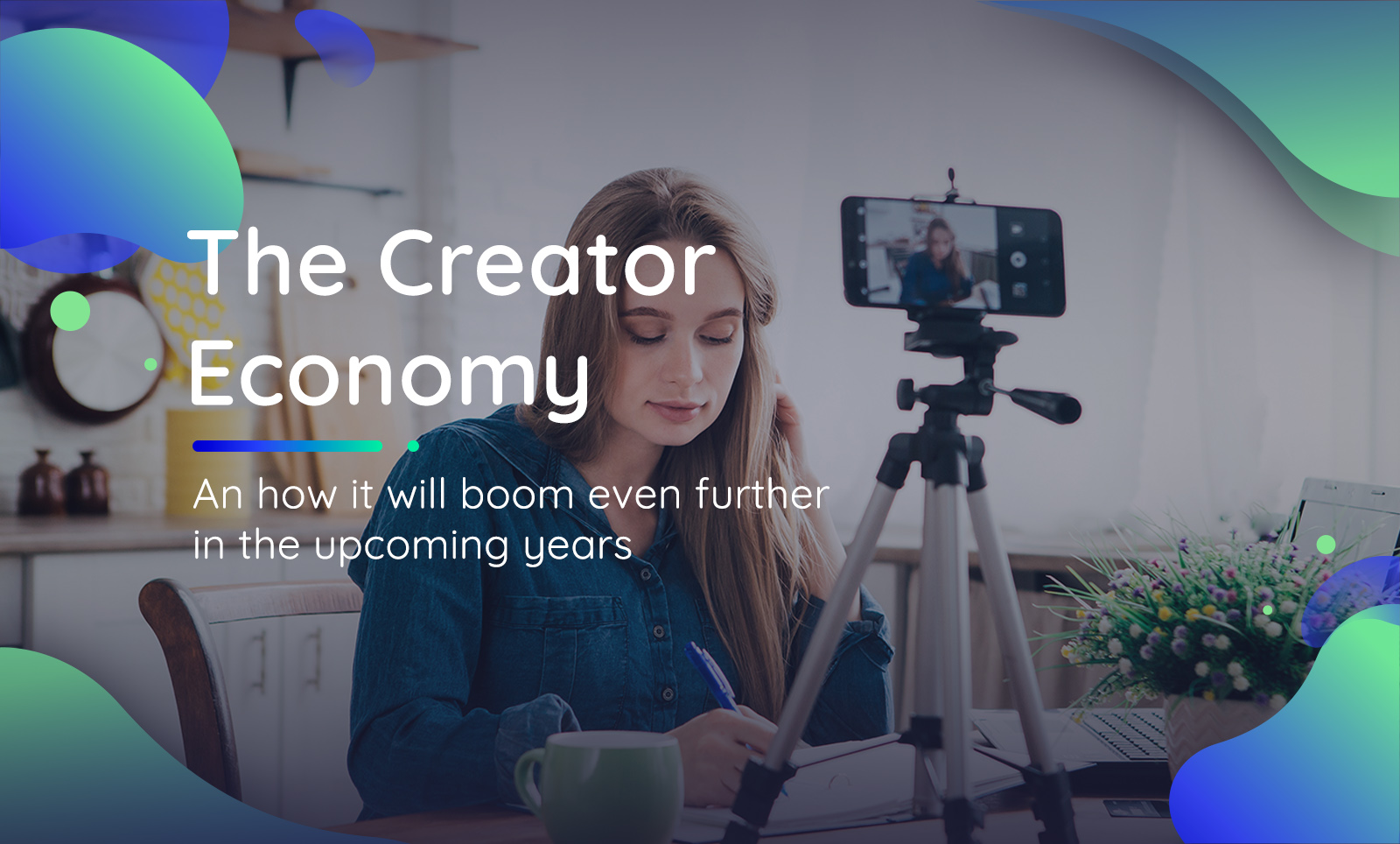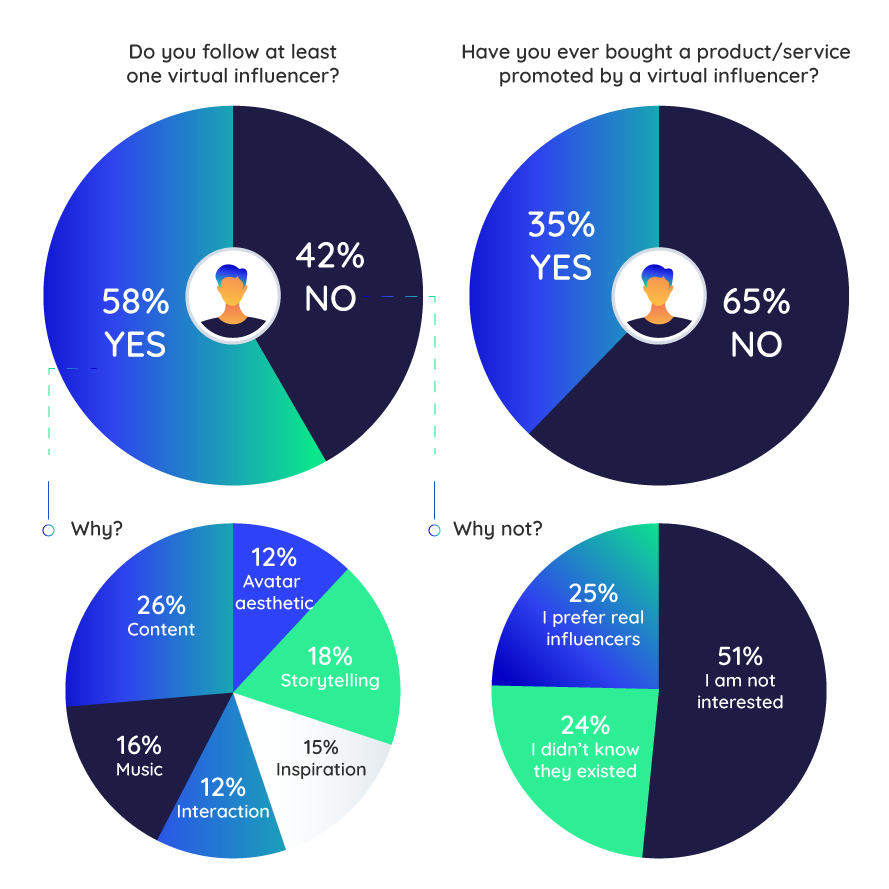
From pixel to power; AI-driven virtual influencers are taking over the marketing game
Though it may sound like it, this isn’t a line from a science fiction novel, but rather a statement of the astonishing evolution of digital marketing in today’s world.
As we deal with the modern and rising challenges of this information era, understanding this rising trend can equip you with resources to survive in the fast-paced world of marketing.
Why should you care?
Because the game is changing. Virtual influencers, powered by sophisticated artificial intelligence, are not just novelty acts anymore; they’re becoming a force within the influencer marketing landscape.
They’re breaking barriers, transcending human limitations, and captivating audiences on a global scale. With their 24/7 availability, consistent brand representation, and zero risk of personal scandals, these digital personas are proving to be an attractive proposition for brands looking to reach and engage with their target audience in innovative ways.

Traditional Influencer Marketing
Influencer marketing has traditionally relied on popular individuals – celebrities, industry experts, or those with large social media followings – to promote products or services.
We discussed in a previous article how the creator economy will boom to reach $480 billion by 2027, as influencers have the ability to sway their followers’ purchasing decisions due to their authority, knowledge, or relationship with their audience.
However, as effective as this method has been and will continue to be, it also comes with its own set of challenges.
Influencer Saturation
As more and more brands have started using influencer marketing, the market has started to become saturated.
This makes it increasingly difficult for brands to stand out and achieve meaningful engagement with consumers.
At Nexoom, we specialize in crafting successful campaigns and have proven our ability to deliver superior content, aligned with any brand audience’s interests, and present brands with cost-effective alternatives. Get in touch if you want your brand to stand out of the crowd!
Unpredictable influencers
Human influencers can be unpredictable, their actions can sometimes conflict with a brand's image.
That’s where AI and virtual influencers come in. With the rise of advanced machine learning algorithms and graphic design techniques, it has become possible to create lifelike digital personalities that could interact with real people in real-time.
Unlike their human counterparts, virtual influencers are entirely controllable entities. They can be anywhere, anytime, portraying any image a brand wants, without the risk of off-brand behavior. This control, coupled with their intriguing novelty, has made them an increasingly popular choice for brands looking to innovate their marketing strategies.
In this article, we give tips and strategies to prevent inauthentic influencer marketing.
Do virtual influencers really work?
Influencers like Lil Miquela, Shudu Gram, or Bermuda, have amassed millions of followers on social media platforms, engaging them with their unique personas and content.
In fact, According to the Bold Creators Club, the virtual influencer market size was about 4.6 billion dollars in 2018. It is projected to register a compound annual growth rate (CAGR) exceeding 26% from 2019-2025.
In addition to this, a recent survey conducted by The Influencer Marketing Factory found that 58% of respondents follow at least one virtual influencer. Interestingly, 24% of users not following virtual influencers didn’t even know they existed.

Let's have a look into a few case studies:
As technology continues to evolve, we can expect these AI-powered personalities to become an integral part of our digital lives, offering brands new and exciting ways to connect with their audiences.
#1
Louis Vuitton and Lightning from Final Fantasy
In 2016, Louis Vuitton surprised everyone by choosing Lightning, a character from the popular video game Final Fantasy XIII, as their new brand ambassador.
The character was featured in print and video ads for the Spring-Summer 2016 collection, sporting the brand’s latest designs. This move was met with a lot of buzz and interest, demonstrating how virtual influencers can effectively generate hype and capture attention.
#2
Diesel and Imma
Diesel, an Italian retail clothing company, made headlines when it used Imma, a virtual influencer, in one of its campaigns.
Imma, who is known for her stylish pink hair and trendy fashion sense, was photographed alongside real models, blurring the line between reality and digital creation. This campaign not only created a lot of conversation around the brand but also demonstrated how seamlessly virtual influencers can be integrated into traditional marketing methods
#3
Diigitals and Shudu
The Diigitals is a digital modeling agency created by Cameron-James Wilson. The agency represents the world’s first digital supermodels, including its most famous model, Shudu, body positive models such as Brenn and Kami, the world’s first virtual influencer with Down Syndrome.
They aim to raise awareness on the overproduction, waste and consumerism that has turned fashion into the second most polluting industry in the world and their goal is to redesign, rethink and restart.
Going back to Shudu Gram, renowned as the world’s first digital supermodel, has been a part of numerous high-profile campaigns.
She was featured in a campaign for luxury fashion brand Balmain, where she appeared alongside two other digital models, Margot and Zhi. Shudu also collaborated with cosmetics brand Fenty Beauty, showcasing their products in various social media posts and has been featured in Vogue and Harper’s Bazaar.
Her stunning visuals and the intrigue surrounding her existence have made her a powerful tool for brands looking to create a lasting impression.
#4
Lil Miquela
Lil Miquela, a virtual influencer who has been making waves in the digital world since her creation in 2016, has established partnerships with several high-end fashion brands. Known for her unique style and influence,
Miquela has collaborated with renowned brands such as Prada, Calvin Klein, and Pacsun. These collaborations have not only boosted her online presence but also significantly contributed to her net worth, which is estimated to be over $10 million as of March 2, 2023.
Miquela’s partnership with these brands has been well-documented across various platforms.
For instance, Miquela’s recent partnership with Pacsun has also garnered significant attention. This collaboration was announced in a Vogue Business article.
The article, titled “10 Virtual Influencers to Watch in 2023,” provides a comprehensive overview of Miquela’s partnerships and her influence in the digital space.
Furthermore, Miquela’s influence extends beyond fashion. She has also made a name for herself in the music industry, with her songs ranking high on Spotify charts. This information was revealed in multiple sources, further solidifying Miquela’s status as a prominent virtual influencer.
Virtual influencers can provide unique opportunities for brands to engage with their audiences
They can offer a fresh perspective, push creative boundaries, and present brands in a novel light. As more and more people become aware of and follow these virtual influencers, their potential as marketing tools will only continue to grow.
However, the advent of technology has brought about new ethical debates in the fashion industry. The rise of digital models and virtual reality in fashion has sparked discussions about job displacement and unrealistic beauty standards. Critics argue that digital models could potentially replace human models, reducing employment opportunities.
Additionally, these perfect, computer-generated models might perpetuate unrealistic beauty standards, leading to mental health disorders like body dysmorphia, eating disorders, depression, and anxiety.
Despite these challenges, there is a growing awareness and push towards ethical practices in the fashion industry. Consumers, influencers, organizations, and even some fashion brands are recognizing the importance of ethical practices and advocating for change.
As we move forward, it’s crucial to balance the benefits of technological advancements with the potential ethical implications they may bring.
How else is AI transforming Influencer Marketing?
Not only is the AI able to create digital models, but it allows us to use a pool of tools that can help us enhance audience targeting, curate and optimize our content.
It’s important to note that while AI and virtual influencers offer many advantages, they also come with risks. Brands must balance the benefits of AI with these potential pitfalls, ensuring they maintain authenticity and ethical standards while leveraging AI’s capabilities for more efficient and effective marketing campaigns.
Audience Targeting
One of the key ways AI is transforming influencer marketing is by aiding in the discovery and selection of the right influencers for specific campaigns.
AI tools can evaluate potential influencers based on their alignment with a brand’s values and mission. They can perform deep searches to identify the influencer’s other brand connections and check their prior activities to reduce risks. This ensures that brands partner with influencers who are not only influential but also compatible with their brand image and objectives.
Content Creation
AI can help create personalized content that is more likely to resonate with a specific audience.
It uses complex algorithms to analyze data and identify the best matches for specific campaigns. These algorithms generate insights about future customer behavior, suggest more personalized content, and spot patterns in large data sets for marketers to act on. This allows brands to tailor their campaigns to the preferences and behaviors of their target audience, thereby increasing the likelihood of success.
For example, virtual influencers can be programmed to post content that aligns perfectly with a brand’s messaging.
Campaigns
Campaign Optimization.
AI can track and analyze the performance of influencer marketing campaigns in real-time, allowing for adjustments to be made on the fly to maximize ROI.
Conclusion
Despite the skepticism around their authenticity, virtual influencers and AI are proving their worth. The AI is reshaping the marketing landscape, offering brands innovative ways to engage with their audiences.
In a world where digital presence is rapidly becoming as important as physical, understanding and leveraging the power of AI-driven virtual influencers and AI-tools could be the key to reaching new heights in today’s digital marketing era.
If you’re looking to find the perfect influencer for your brand, get in touch!
The New Frontier in Global Brand Advertising
The content creator’s ability to deliver superior content, aligned with their audience’s interests, presents brands with cost-effective alternatives to traditional advertising methods.
The power of Authenticity for Effective Advertising
Authenticity plays a crucial role in influencer marketing and greatly impacts the effectiveness of advertising campaigns. Learn how to carry out your campaign authentically!
Beyond Gaming: The rise of non-gaming content
Why settle for being the best gaming streaming platform when you have the potential to be the best non-gaming platform as well? The winds of change are blowing and we’re feeling the chills.